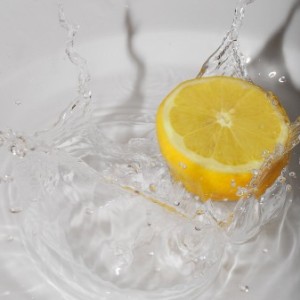Reasons Your Body Needs Water
- It helps regulate a normal body temperature
- It carries nutrients to your organs and tissues
- It transports oxygen to your body cells
- It protects and lubricates your joints and organs
- It protects your spinal cord
- It helps regulate your appetite
- It helps remove waste (urination, bowel movements, and perspiration).
Water is definitely needed for a healthy body!
How Much Water Do You Need?
Easy answer: Take your weight and divide it in half. Example: Weight (200 lbs) ÷ 2 = 100 oz. of water per day. Always make sure you drink when you are thirsty and drink during your meals.
How Can I Get In More Water?
- Carry a bottle around with you at work, home, or if you are running errands.
- Drink water when you are eating out. It will save you money and it provides no calories.
- Fill up ½ of a freezer-safe bottle with water and freeze it. Take it out one morning and fill the rest of it with water to have cold water all day.
- At work, ask if your boss can supply the office with water bottles or an office water cooler.
- Eat more foods with high water content. Examples include soups, broths, celery, tomatoes, melons, and oranges.
- If you get bored drinking water, there are other no-calorie options to add variety to your day! Unsweetened tea (hot or cold), coffee, and seltzer are all good options to try. Also, try adding a squeeze of lemon or lime juice to make your water more flavorful.
Losing Weight and Drinking More Water
Drinking water also helps people lose or maintain their body weight. In a recent study, people who drank 2 cups of water before meals lost more weight than those who didn’t. The people who drank before their meals ate ~75-90 calories less at their meals. Plus, drinking water can help edge out calories from high calorie beverages like juice, soda, sports drinks, fruit drinks, alcohol, and sweetened tea or coffee. This is helpful because an excess of sugar means an excess of calories and these calories are stored in your body as fat. There is growing evidence that your body doesn’t respond to calories you drink in the same way it responds to calories you eat. It’s like your body doesn’t register the calories you drink to make you feel full while eating.
Protecting Against Dehydration
Especially during the summer months, water can also help protect you against dehydration. People become dehydrated through sweating, breathing, and urination. The more active you are, the more fluids you need. Also, diuretics, certain medications, and even alcohol may contribute to an increase in the amount of water you lose. Lost fluids need to be replaced. Common sign/symptoms of dehydration include thirst, headaches, constipation, a strong order in your urine, dark yellow urine, and pain in the joints/muscles. *Remember you need more water when you are in warmer climates, running a fever, exercising more, and/or experiencing diarrhea/vomiting.
Image courtesy of Sam Fox Photography on Flickr

